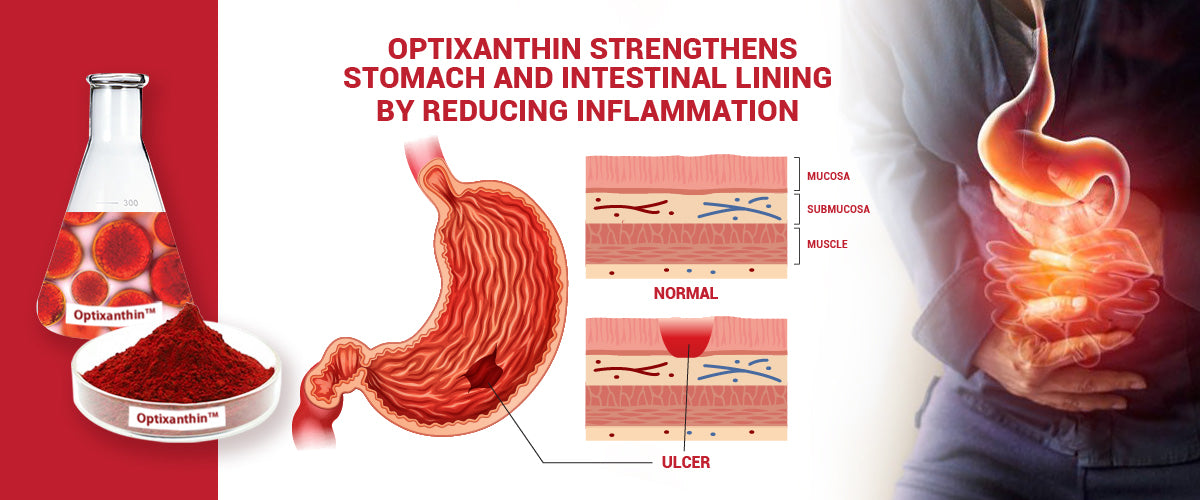A healthy digestive system plays an important role in a healthy lifestyle, as it is the most sensitive component in our body. There is a very destructive bacterium normally found in the stomach called Helicobacter pylori. Its initial manifestation is in the form of chronic gastritis and stomach ulcers1.
The pathological symptoms of this infection include inflammation of the stomach lining and high levels of oxidative stress.

Astaxanthin, with both antioxidant and anti-inflammatory properties has demonstrated positive effect in the reduction of H.Pylori infection and supporting the gastrointestinal system2. The reduction in oxidative stress helps protect the stomach and intestinal lining, which prevents ulcer formation3.
Whereas in liver, the damage is mostly caused by excess lipid accumulation, insulin resistance, as well as when the lipid oxidation products in the liver interact due to unhealthy lifestyle and eating habits. Astaxanthin has been shown to inhibit the formation of fatty liver by reducing oxidative stress and restore functions of liver.
A study which was done in Sweden, showed results both in test tubes and in live mice. Natural Astaxanthin in algae meal inhibited the growth of H. pylori in-vitro. In the exvivo part of this study, the mice that ate the Haematococcus algae meal showed lower bacteria levels and lower inflammation scores than untreated or control meal treated mice when tested one day after as well as ten days after the cessation of treatment4.
One study examined the protective effects of Astaxanthin versus Vitamin E of rat liver cells against lipid peroxidation. It was found that Astaxanthin was a much more effective antioxidant for these liver cells5.
Liver benefits were also seen in a rat study in 2001, where Astaxanthin’s antioxidant properties appeared to protect the rats from liver damage. A measurable increase in superoxide dismutase (SOD) and glutathione was found in the rats’ livers6.
Astaxanthin and VCO also helps in:
- Strengthening gut lining and integrity by reducing intestinal inflammation
- Decreasing H. pylori infection, which then lowers the gastric inflammation
- Reducing clinical symptoms in dyspepsia patients
- VCO helps in treating urinary tract infection (UTI) and supports the kidney health
References:
- www.purehealingfoods.com/docs/NaturalAstaxanthin_King_of_the_Carotenoids.pdf
- https://healthcareweekly.com/astaxanthin/
- Wang, X., Willen, R., Wadstrom, T. (2000). “Astaxanthin-rich algal meal and vitamin C inhibit Helicobacter pylori infection in BALB/cA mice.” Antimicrobial Agents and Chemotherapy. 44(9):2452-7.
- Kurashige, M., Okimasu, M., Utsumi, K. (1990). “Inhibition of oxidative injury of biological membranes by astaxanthin.” Physiol. Chem. Phys. Med. NMR 22(1):27-38
- Kang, J., Kim, S., Kim, H. (2001). “Effect of astaxanthin on the hepatotoxicity, lipid peroxidation and antioxidative enzymes in the liver of CCl4-treated rats.” Methods and findings in experimental and clinical pharmacology. 23(2):79-84.
- Life-enhancement.com, Astaxanthin.
